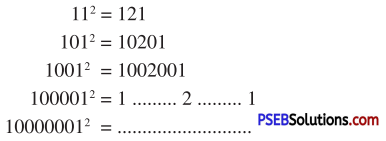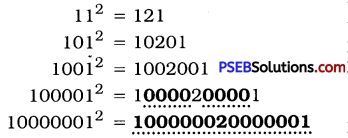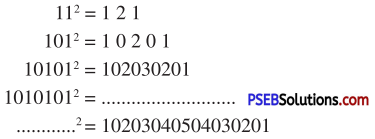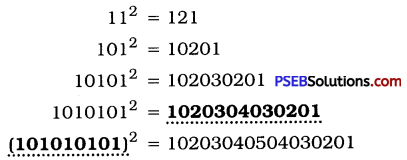Punjab State Board PSEB 8th Class Maths Book Solutions Chapter 6 Squares and Square Roots Ex 6.1 Textbook Exercise Questions and Answers.
PSEB Solutions for Class 8 Maths Chapter 6 Squares and Square Roots Ex 6.1
1. What will be the unit digit of the squares of the following numbers?
Question (i).
81
Solution:
81
Here, the ending digit is 1.
1 × 1 = 1
∴ The unit digit of (81)2 will be 1.
Question (ii).
272
Solution:
272
Here, the ending digit is 2.
2 × 2 = 4
∴ The unit digit of (272)2 will be 4.
Question (iii).
799
Solution:
799
Here, the ending digit is 9.
9 × 9 = 81
∴ The unit digit of (799)2 will be 1.
![]()
Question (iv).
3853
Solution:
3853
Here, the ending digit is 3.
3 × 3 = 9
∴ The unit digit of (3853)2 will be 9.
Question (v).
1234
Solution:
1234
Here, the ending digit is 4.
4 × 4 = 16
∴ The unit digit of (1234)2 will be 6.
Question (vi).
26387
Solution:
26387
Here, the ending digit is 7.
7 × 7 = 49
∴ The unit digit of (26387)2 will be 9.
Question (vii).
52698
Solution:
52698
Here, the ending digit is 8.
8 × 8 = 64
∴ The unit digit of (52698)2 will be 4.
Question (viii).
99880
Solution:
99880
Here, the ending digit is 0.
0 × 0 = 0
∴ The unit digit of (99880)2 will be 0.
![]()
Question (ix).
12796
Solution:
12796
Here, the ending digit is 6.
6 × 6 = 36
∴ The unit digit of (12796)2 will be 6.
Question (x).
55555
Solution:
55555
Here, the ending digit is 5.
5 × 5 = 25
∴ The unit digit of (55555)2 will be 5.
2. The following numbers are obviously not perfect squares. Give reason:
Question (i).
1057
Solution:
1057
Here, the ending digit is 7, which is not one of the digits 0, 1, 4, 5, 6 or 9.
∴ 1057 is not a perfect square.
Question (ii).
23453
Solution:
23453
Here, the ending digit is 3, which is not one of the digits 0, 1, 4, 5, 6 or 9.
∴ 23453 is not a perfect square.
![]()
Question (iii).
7928
Solution:
7928
Here, the ending digit is 8, which is not one of the digits 0, 1, 4, 5, 6 or 9.
∴ 7928 is not a perfect square.
Question (iv).
222222
Solution:
222222
Here, the ending digit is 2, which is not one of the digits 0, 1, 4, 5, 6 or 9.
∴ 222222 is not a perfect square.
Question (v).
64000
Solution:
64000
Here, the number of zeros at the end is odd.
∴ 64000 is not a perfect square.
Question (vi).
89722
Solution:
89722
Here, the ending digit is 2, which is not one of the digits 0, 1, 4, 5, 6 or 9.
∴ 89722 is not a perfect square.
![]()
Question (vii).
222000
Solution:
222000
Here, the number of zeros at the end is odd.
∴ 222000 is not a perfect square.
Question (viii).
505050
Solution:
505050
Here, the ending digit is 0. (Number of odd zero.)
∴ 505050 is not a perfect square.
3. The squares of which of the following would be odd numbers ?
(i) 431
(ii) 2826
(iii) 7779
(iv) 82004
Solution:
[Note: The square of an odd natural number is odd and that of an even number is an even number.]
(i) 431
This is an odd number.
∴ (431)2 is an odd number.
(iii) 7779
This is an odd number.
∴ (7779)2 is an odd number.
![]()
4. Observe the following pattern and find the missing digits:

Solution :
Observing the above pattern, we can find the missing digits as follows :

5. Observe the following pattern and supply the missing numbers :

Solution:
Observing the above pattern, we can find the missing numbers as follows :

![]()
6. Using the given pattern, find the missing numbers:
12 + 22 + 22 = 32
22 + 32 + 62 = 72
32 + 42 + 122 = 132
42 + 52 + …….2 = 212
52 + ……2 + 302 = 312
62 + 72 + ……2 = ……2
[To find pattern:
Third number is related to first and second number. How?
Fourth number is related to third number. How?]
Solution:
(a)2 + (a + 1)2 + {a (a + 1 )}2
= {a (a + 1) + 1}2
The missing numbers are :
12 + 22 + 22 = 32
22 + 32 + 62 = 72
32 + 42 + 122 = 132
42 + 52 + 202 = 212
52 + 62 + 302 = 312
62 + 72 + 422 = 432
7. Without adding, find the sum:
Question (i).
1 + 3 + 5 + 7 + 9
Solution:
The sum of first five odd numbers = 52
= 5 × 5
= 25
Question (ii).
1 + 3 + 5 + 7 + 9 + 11 + 13 + 15 + 17 + 19
Solution:
The sum of first ten odd numbers = 102
= 10 × 10
= 100
Question (iii).
1 + 3 + 5 + 7 + 9 + 11 + 13 + 15 + 17 + 19 + 21 + 23
Solution:
The sum of first twelve odd numbers = 122
= 12 × 12
= 144
![]()
8.
Question (i).
Express 49 as the sum of 7 odd numbers.
Solution:
49 = 72 = Sum of first seven odd numbers
∴ 49 = 1 + 3 + 5 + 7 + 9 + 11 + 13
Question (ii).
Express 121 as the sum of 11 odd numbers.
Solution :
121 = 112 = Sum of first eleven odd numbers
∴ 121 = 1 + 3 + 5 + 7 + 9 + 11 + 13 + 15 + 17 + 19 + 21
9. How many numbers lie between squares of the following numbers?
[Note : Between n2 and (n + 1)2, there are 2n non-square numbers.]
Question (i).
12 and 13
Solution:
Natural numbers between 122 and 132
= 2 × 12
= 24. (2n, n = 12)
![]()
Question (ii).
25 and 26
Solution:
Natural numbers between 252 and 262
= 2 × 25
= 50. (2n, n = 25)
Question (iii).
99 and 100
Solution:
Natural numbers between 992 and 1002
= 2 × 99
= 198. (2n, n = 99)
